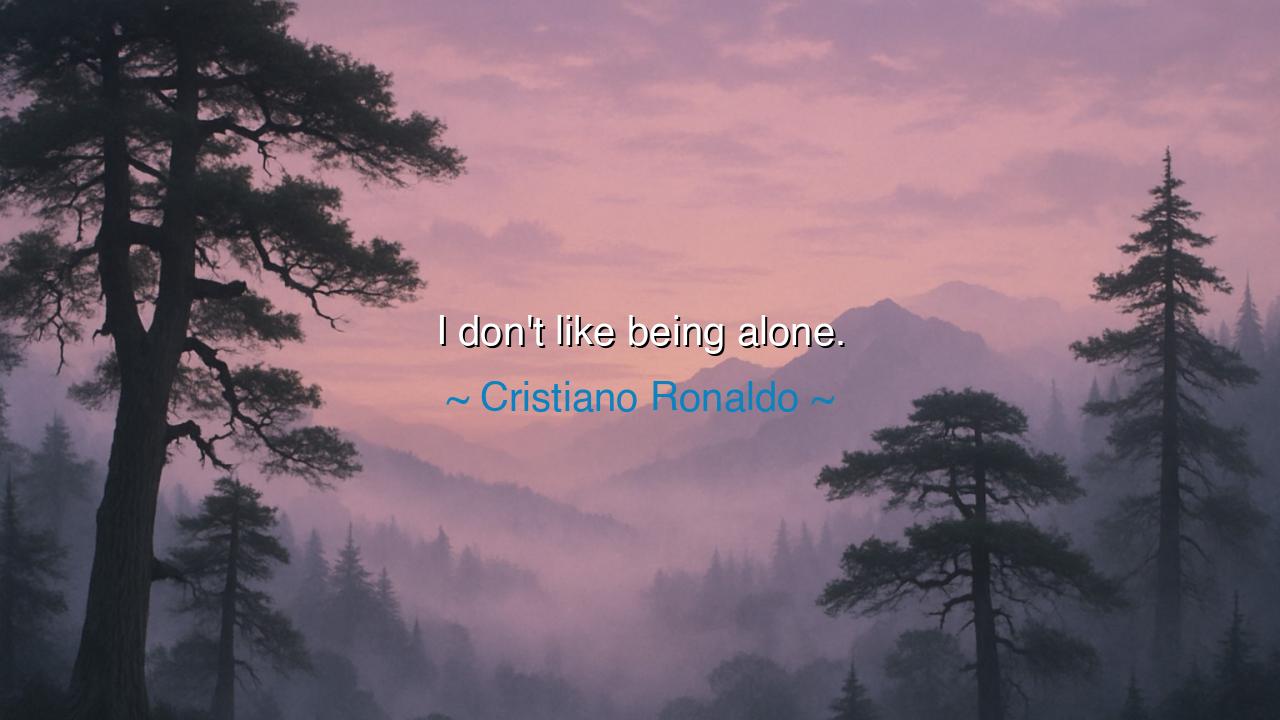
I don't like being alone.






"I don't like being alone." These words from Cristiano Ronaldo resonate with a deeply human truth: the longing for companionship, for connection, and for a sense of belonging. In this simple statement, Ronaldo reveals something universally shared—our innate desire to connect with others. Though he is often seen as a powerful, self-sufficient figure in the world of sport, these words expose a vulnerability that speaks to the essence of the human spirit: we are not solitary beings by nature, but creatures who thrive in relationship and community.
This desire for connection is not a weakness, but a reflection of our shared human condition. The ancient Greek philosophers recognized this truth, particularly Aristotle, who argued that man is a social animal. For Aristotle, true happiness and fulfillment come not from solitude but from participating in the shared life of others. He believed that the highest form of human existence could only be achieved in community—in relationships with others where love, friendship, and mutual respect could flourish. Ronaldo’s confession, though simple, reflects this fundamental understanding of the need for companionship.
Consider the life of Alexander the Great, a man whose military genius and ambition led him to conquer much of the known world. Despite his vast achievements, Alexander often found himself isolated, far from home and surrounded by men who could never truly understand the weight of his vision. In his solitude, he turned to friendship for strength. His bond with Hephaestion, his closest friend and confidant, was crucial to his success and personal well-being. It is said that Alexander wept at the death of Hephaestion, showing how deeply his need for companionship and understanding ran, even in the face of monumental power. Like Ronaldo, Alexander was a man who, despite his greatness, recognized the importance of human connection.
In the same vein, Ronaldo’s words speak to the universal struggle between individual greatness and the need for connection. In a world where many strive for self-sufficiency and independence, the vulnerability of acknowledging one's need for companionship becomes an act of courage. It is an admission that even the greatest among us—whether athletes, leaders, or kings—are bound by the same human needs. To admit the discomfort of being alone is not a sign of weakness but an understanding that no one can truly thrive in isolation. Loneliness is a condition that, if not addressed, can lead to despair, a shadow that even the strongest can struggle to escape.
In the ancient teachings, this need for connection was not only physical or emotional but also spiritual. Confucius emphasized the importance of relationships in the cultivation of a virtuous life, stating that “to be in harmony with others” is a reflection of one’s own inner harmony. It is in these relationships that we learn compassion, empathy, and patience—qualities that allow us to grow not only as individuals but as part of something larger than ourselves. Ronaldo's words remind us of this ancient wisdom: that true strength is not found in solitary achievements but in how we connect with and uplift those around us.
Yet, Ronaldo's vulnerability also teaches us a powerful lesson about the importance of self-awareness. He is a man who has achieved heights few will ever reach, but in his admission that he does not like being alone, he shows us that true fulfillment comes from acknowledging our needs. Self-sufficiency does not mean independence from others; rather, it means the ability to recognize when we need others and embrace those connections. This humility in acknowledging our need for companionship is the key to genuine growth and the path to a more balanced life.
Thus, the lesson from Ronaldo’s simple statement is not only about the importance of connection but also about the power of vulnerability. We must not shy away from admitting that we need others to thrive. Just as Ronaldo relies on his teammates, coaches, and loved ones for support, so must we reach out to those who help sustain us. To be open to connection, to embrace our humanity, and to seek companionship is not a weakness, but a strength. In practical terms, this means not shying away from forming deep relationships, whether with family, friends, or colleagues, and recognizing that love, support, and shared purpose are the pillars upon which our greatest achievements stand.
Ronaldo's words are a timeless reminder that we are not meant to journey through life alone. True greatness is achieved not by isolating ourselves, but by embracing the connections that fuel us, allowing us to grow and flourish alongside others. Whether in the world of sports, in our careers, or in our personal lives, we must remember that the path to true fulfillment lies not just in our own strength, but in how we connect, share, and uplift those around us.






AAdministratorAdministrator
Welcome, honored guests. Please leave a comment, we will respond soon